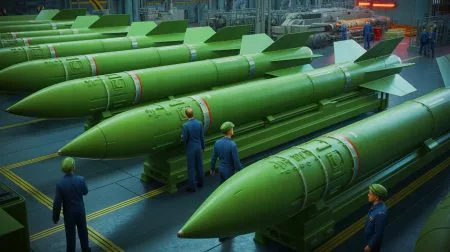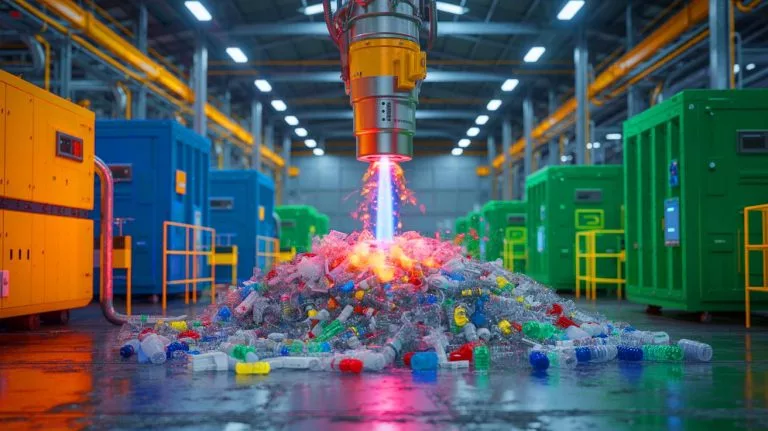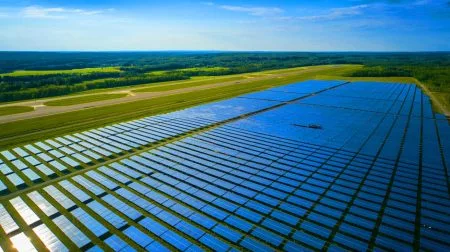| IN A NUTSHELL |
|
In a groundbreaking development, South Korean researchers have unveiled the world’s first hydrogen-powered plasma torch technology, a significant leap forward in recycling capabilities. This innovation, capable of breaking down unsorted plastic waste into valuable chemicals at temperatures soaring to 3,600°F, promises to revolutionize how we approach plastic recycling. Spearheaded by the Korea Institute of Machinery and Materials (KIMM), this technology eliminates the need for sorting plastics, a major hurdle in current recycling processes. As environmental concerns mount globally, such advancements could pave the way for more sustainable waste management solutions, addressing both ecological and economic challenges.
Harnessing Plasma-Based Processes
The core of this revolutionary technology is a plasma-based process, utilizing a state of highly energized gas to efficiently decompose mixed plastic waste in less than 0.01 seconds. Traditional methods like pyrolysis, which operate at significantly lower temperatures between 842°F and 1,112°F, often result in a multitude of by-products, many of which have limited utility. The newly developed plasma process stands apart by overcoming these limitations with its ultra-high-temperature operation, ensured by the use of 100% hydrogen fuel. This rapid decomposition effectively breaks down polymer structures while suppressing carbon formation, a notable achievement highlighted by the research team.
Dr. Young-Hoon Song, head of the research program, emphasized the economic conversion of mixed waste plastics into raw materials. This method not only simplifies the recycling process but also enhances its efficiency by reducing unwanted by-products. The implications of this technology are vast, offering a more sustainable solution to the global plastic waste crisis.
Ensuring Stable Operations
One of the key advantages of this new technology is its ability to maintain stability and continuity in operations. The use of a hydrogen-fueled plasma torch prevents the formation of carbon soot, a common issue in other recycling processes. This controlled environment selectively converts plastic waste into ethylene and benzene with a high selectivity rate of 70-90%. The purification process that follows results in raw materials that are over 99% pure, making them suitable for creating new plastics.
The breakthrough addresses a major challenge in chemical recycling, which has been hampered by high costs and the complexities of sorting plastic waste. The plasma process also proves effective on waxy residues from other methods, converting them into useful chemicals with over 80% selectivity. As a collaborative initiative involving KRICT, KITECH, KIST, and various universities, the project is gearing up for commercial application, with pilot operations showing promising cost comparisons to traditional fossil fuel sources. Long-term demonstration operations in South Korea are slated for 2026, marking a significant step toward industrial-scale implementation.
Potential for Carbon-Free Recycling
The potential applications of this technology extend beyond recycling. Dr. Dae Hoon Lee, a researcher on the project, noted that the sub-technologies developed could be adapted for use in other fields, including greenhouse gas treatment in semiconductor and display manufacturing. When powered by renewable energy sources, the plasma-based process could achieve a carbon-free method of recycling plastic, further enhancing its environmental benefits.
In a separate but related development, researchers at Northwestern University have devised a method to convert stubborn single-use plastics into valuable products like fuels, waxes, and lubricants. This process employs an inexpensive nickel-based catalyst to selectively break down polyolefins, which constitute nearly two-thirds of global plastic consumption. These advancements collectively signal a transformative era in materials science and environmental engineering.
Implications for the Future of Recycling
The implications of the hydrogen plasma torch technology are profound, signaling a potential shift in how we handle plastic waste on a global scale. The reduction in sorting requirements and the ability to produce high-purity raw materials could dramatically increase recycling rates, which have been historically low. This innovation could also lead to reduced reliance on fossil fuels, as the cost of producing ethylene through this method is comparable to traditional sources.
As pilot demonstrations progress and the technology moves toward commercial readiness, questions remain about its scalability and integration with existing recycling infrastructure. The journey toward a sustainable future is complex, and innovations like these are crucial to navigating the environmental challenges we face. Will these advancements in recycling technology lead to a broader adoption of sustainable practices across industries?
Did you like it? 4.7/5 (29)








This is amazing! Can’t wait for this tech to be implemented worldwide. 🌍
Wow, this sounds like a sci-fi movie come to life! How soon can we expect this tech to be used globally? 🤔
How much energy does the torch consume? Is it really carbon-free?
Isn’t 3600°F really hot? How do they ensure safety when operating the plasma torch?
Great innovation! Hope this helps reduce ocean plastic waste significantly. 🌊🐢
Sounds too good to be true. What’s the catch? 🤔
I’m skeptical. If it’s so effective, why haven’t we heard about similar technologies before?
Thank you Korean scientists! This is a game-changer for recycling. 🙌
Thanks to these Korean scientists, maybe we can finally tackle the plastic pollution problem. 🌍
What happens to the non-plastic parts of unsorted garbage?
What a breakthrough! Can this be used for other types of waste too?
Will this process be affordable for widespread use, or is it just for big industries?
How soon can we expect this technology to be available globally?
This is great news! But what happens to the 1% of chemicals that aren’t pure?
Seriously, 0.01 seconds? That’s faster than a blink!
Hope this doesn’t cost a fortune to implement. 💸
Does it work on all types of plastics?
Can this technology be scaled up for industrial use?
Finally, a real solution to our plastic problem! Thank you! 😊
Will this technology create any harmful by-products?
Is there a risk of hydrogen explosions with this torch?
Plasma torch sounds very sci-fi! 🔥👨🔬
What are the environmental impacts of this new technology?
Can it process plastic mixed with organic waste?
Sounds promising, but how much will it cost per ton of waste processed?
Hope it won’t take long to get this technology to developing countries. 🌐
How does this compare with other recycling technologies in terms of efficiency?
This is like the Iron Man of recycling tech! 🦾
Is there a demonstration video of this torch in action?
How does this affect local recycling jobs?
What are the implications for existing recycling facilities?
Can the chemicals produced be used immediately, or do they need further processing?
Why hasn’t anyone thought of this before? Genius! 🤯
What’s the lifespan of the plasma torch? Is it durable?
Will this lead to new regulations in waste management?
Can this technology be used in space to manage waste? 🚀
How reliable is the 99% purity claim?
Does the torch require any special maintenance?
How does it handle hazardous plastics?
Can we visit the research facility to see it in action?
Finally, a step toward a cleaner planet! 🌟